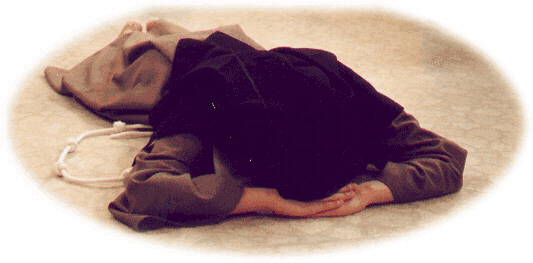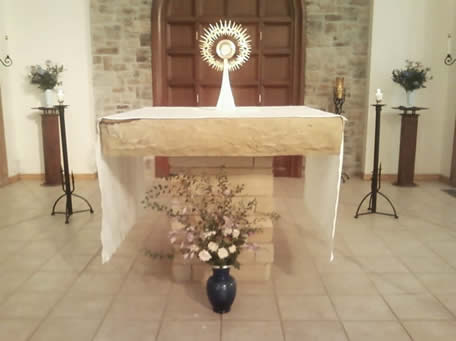|

|
|
|
|
Poor Clares are called "Contemplatives", not because we are the only
ones who practice "contemplation", but because our whole lifestyle
is designed to foster contemplative prayer. Our silence helps us to
listen to God who speaks in our hearts. Our poverty, simplicity of
life and the discipline of self-denial serve to remove those desires
which are obstacles to union with our true Beloved. The daily
schedule, which calls us again and again to the temple for prayer,
does not allow us to forget the "one thing necessary". Even our
religious habit as well as the sparse decor of the monastic rooms
remind us of who we are as worshipers of God. |

|
|
Pope John Paul II says that one draws close to the presence of God,
Father, Son and Holy Spirit, "above all by letting oneself be taught
an adoring silence. At the culmination of the knowledge and experience
of God, says the Holy Father, is his absolute transcendence." This is
reached, he goes on to say, through "the prayerful assimilation of
Scripture and the liturgy." This adoring silence is absolutely
essential to our reading of Scripture, absolutely essential to our
celebration of the sacred liturgy, absolutely essential to theology
and to preaching, to our commitments in society and in family, and to
the wholeness and authenticity of our lives as human beings. |
|
| This is
the Christian pilgrimage: from the noisy pride of our sinfulness to
the adoring silence of faith, hope and love, and from the adoring
silence of faith, hope, and love to the divinizing glory of God,
Father, Son and Holy Spirit. The Most Holy Trinity is the central
mystery of our faith. It is the radiant core of what we believe as
Christians. It is the 'complete truth' into which we are led by the
Holy Spirit, according to the promise of Jesus. The Holy Spirit
teaches us the way of adoring silence, whispering to us like a gentle
breeze, drawing us to the Father, like the Son, with the Son and
through the Son. |
 |
|
|
We have
been baptized into a relationship with the Father through the Son in
the Holy Spirit. The Three Divine Persons dwell within us. We are
inhabited by their glory. We are never left alone, even in the moments
of our greatest solitude. We carry within ourselves the adorable
mystery of the Trinity. God, Father, Son and Holy Spirit, is present
within our hearts, present to us, present for us. It is we who fail to
be present to the Presence within us, because we are alienated from
our deepest selves, afraid to descend into the depths of our own
mystery, ever escaping into noise and feverish activity, so as to
avoid interior silence at all costs. |
For
St. Clare, contemplation of God begins with the God-man, Christ Jesus.
In a letter to one of her followers, St. Agnes of Prague, she writes,
"As a poor virgin, embrace the poor Christ. Look upon Him who became
contemptible for you, and follow Him, making yourself contemptible in
the world for Him. Your Spouse, though more beautiful than the
children of men became, for your salvation, the lowest of men,
despised, struck, scourged untold times throughout His whole body, and
then died amid the sufferings of the Cross. O most noble Queen, gaze
upon Him, consider Him, contemplate Him, as you desire to imitate
Him." Christian contemplation, and especially Clarian contemplation,
is always personal, leading to an intimate, loving relationship with
the Divine Persons. After experiencing divine love, the daughter of
Clare must then follow the exhortation of her Mother: "Show forth in
your actions the love which you have
within you". |
 |
|
There is a way back to our own deepest selves. There is a way back to
the presence of the indwelling Trinity. The way back is the way of
adoring silence. "Be still and know that I am God" (Ps 45:11). |
|
|